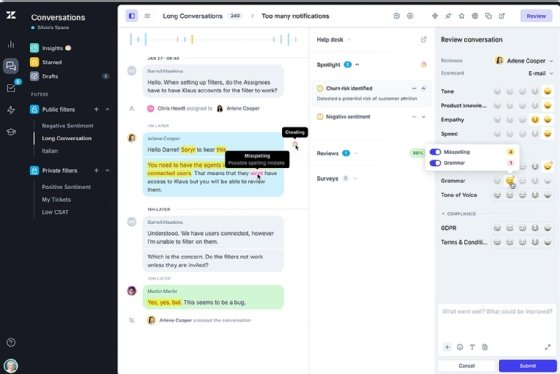Zendesk users get generative AI infusion for customer service (original) (raw)
Zendesk customers get their shot of GenAI, which comes in the form of agent tools, self-service workflow assistants and workforce management features.
Generative AI has become a major component in contact center tech this year. Every customer interaction is captured, measured and analyzed by AI, and generative AI is becoming a big part of the evaluation, summarization and coaching that follows.
Zendesk users are the latest group to get a GenAI package that can run QA processes on all customer contacts, which traditionally couldn't be done without automation; managers randomly examined cases to evaluate agent performance. Zendesk follows other vendors such as Amazon and Google, who earlier this month introduced similar capabilities to their customer service AI offerings.
Features Zendesk rolled out include tools that examine all bot interactions with customers as well as human interactions, be they on digital or voice channels. For the agents, Zendesk added Agent copilot, which includes customer intent understanding, knowledge article summarization and sentiment analysis to help agents personalize service with automated tools that learn the most effective ways to answer questions as they go along.
Other workforce management tools Zendesk rolled out include generative AI reporting tools that can optimize operations, such as predicting how many agents are needed for a shift. That is crucial for Zendesk user UrbanStems, a florist serving the U.S. market based in Washington, D.C., said Laura McDonald, the company's director of customer happiness and beta tester of the Zendesk features released today.
Her contact center fluctuates from 17 year-round agents to 200 during busy periods, such as Valentine's Day and Mother's Day. AI tools not only help predict how many agents will be needed and for which shifts, but the generative AI tools help make the seasonal workers who come in to help more effective by feeding them fine-tuned content to solve the customer's problem.
"It has actually helped us reduce our training time because it's feeding agents what they need in the context panel," McDonald. "So instead of an agent taking three or four shifts to really get up to maximum efficiency, they're now hitting it by Shift 2, which has been an incredible gain for us."

Automated quality-assurance tools on the Zendesk platform use different types of AI to measure agent -- human or virtual -- performance in every customer interaction.
Constellation Research analyst Liz Miller said that Zendesk's application of generative AI to workforce management is innovative because of the way it takes purely sales-centric CRM data and commingles it with the traditional contact center management data. It has the potential to make the prediction of contact center staffing more accurate.
"You can ask those types of questions of your AI and start to actually schedule for the realities of your business and of your people rather than on just what happened in the last month," Miller said. "So it changes that predictive paradigm to some degree."
Some contact center technology vendors, such as Cisco Webex, are thinking about agent wellness when building new features into their platforms. GenAI overall can help agent wellness, Zendesk VP of product Cristina Fonseca said, because it fills in the picture of what an agent's shift will likely look like and prioritizes work for agents who begin every day with a mountain of tickets.
"It's unmanageable to have someone coming in every day with thousands of requests to handle not having clarity of where to start. It's just very overwhelming," Fonseca said. "We can use technology to tell them, 'Look, the priority thing you need to do in the morning is to be on chats for two hours -- because they're real-time and high priority requests -- then you can go process the backlog on email, then you're tasked to be hour on the phone.' Just having that level of predictability and organization can really help reduce stress for agents."
The Zendesk features were released in conjunction with the Zendesk Relate user conference. Pricing has yet to be announced as Zendesk considers different models.
Don Fluckinger is a senior news writer for TechTarget Editorial. He covers customer experience, digital experience management and end-user computing. Got a tip? Email him.
 By: Joe O’Halloran
By: Joe O’Halloran  Zendesk adds a twist to AI outcomes-based CX pricing
Zendesk adds a twist to AI outcomes-based CX pricing  By: Don Fluckinger
By: Don Fluckinger  AWS' Amazon Q in Connect adds more contact center GenAI
AWS' Amazon Q in Connect adds more contact center GenAI